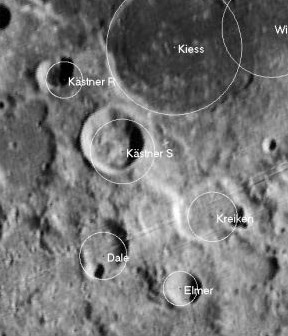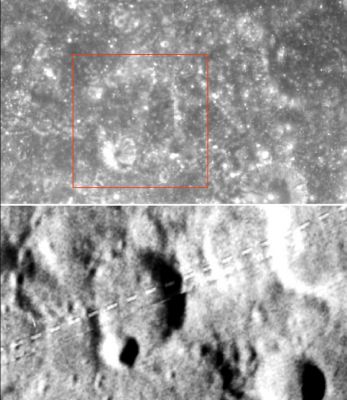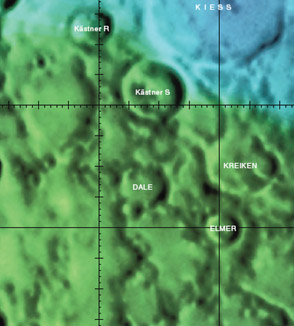Difference between revisions of "Dale"
| Line 19: | Line 19: | ||
''([[LAC%20zone|LAC zone]] 81C1)'' [http://www.lpi.usra.edu/resources/mapcatalog/LTO/lto81c1_1/ LTO map] [http://planetarynames.wr.usgs.gov/images/Lunar/lac_81.pdf USGS Digital Atlas PDF]<br /> <br /> | ''([[LAC%20zone|LAC zone]] 81C1)'' [http://www.lpi.usra.edu/resources/mapcatalog/LTO/lto81c1_1/ LTO map] [http://planetarynames.wr.usgs.gov/images/Lunar/lac_81.pdf USGS Digital Atlas PDF]<br /> <br /> | ||
==Description== | ==Description== | ||
| − | '''Dale''' lies just south of the [http://the-moon.us/wiki/Smythii Smythii Basin] -- a 740 kilometre-wide basin of the [http://the-moon.us/wiki/Stratigraphy pre-Nectarian] period (~ 4.6 to 3.92 bn years). The rim of the crater looks relatively worn all around, however, while its northern sector shows signs of an old impact event on the outer, northern edge of the crater, the southern sector has a similarly-sized impact event where a crater about a third of the diamater of '''Dale''' itself has formed on top of the rim. The floor of '''Dale''' show little signs of change and, overall, the crater doesn't have any significancant detail of note. <span class="membersnap">- | + | '''Dale''' lies just south of the [http://the-moon.us/wiki/Smythii Smythii Basin] -- a 740 kilometre-wide basin of the [http://the-moon.us/wiki/Stratigraphy pre-Nectarian] period (~ 4.6 to 3.92 bn years). The rim of the crater looks relatively worn all around, however, while its northern sector shows signs of an old impact event on the outer, northern edge of the crater, the southern sector has a similarly-sized impact event where a crater about a third of the diamater of '''Dale''' itself has formed on top of the rim. The floor of '''Dale''' show little signs of change and, overall, the crater doesn't have any significancant detail of note. <span class="membersnap">- JohnMoore2</span><br /> <br /> |
==Description: Wikipedia== | ==Description: Wikipedia== | ||
[http://en.wikipedia.org/wiki/Dale_(crater) Dale]<br /> <br /> | [http://en.wikipedia.org/wiki/Dale_(crater) Dale]<br /> <br /> | ||
| Line 29: | Line 29: | ||
Sir Henry Hallett; British physiologist; Nobel laureate (1875-1968).<br /> | Sir Henry Hallett; British physiologist; Nobel laureate (1875-1968).<br /> | ||
| − | * This name appears on [http://www.lpi.usra.edu/resources/mapcatalog/LTO/lto81c1_1/ LTO-81C1]. It does not appear to replace any previous IAU-approved designation. Although it appears in the cumulative list of approved names printed in [[IAU%20Transactions%20XVB|IAU Transactions XVB]], when and how it came to be approved is not entirely clear from the IAU record. <span class="membersnap">- | + | * This name appears on [http://www.lpi.usra.edu/resources/mapcatalog/LTO/lto81c1_1/ LTO-81C1]. It does not appear to replace any previous IAU-approved designation. Although it appears in the cumulative list of approved names printed in [[IAU%20Transactions%20XVB|IAU Transactions XVB]], when and how it came to be approved is not entirely clear from the IAU record. <span class="membersnap">- JimMosher</span> |
<br /> | <br /> | ||
==LPOD Articles== | ==LPOD Articles== | ||
Latest revision as of 20:09, 16 April 2018
Contents
Dale
|
Lat: 9.6°S, Long: 82.9°E, Diam: 22 km, Depth: 2.25 km, Rükl: 49 | ||
Images
LPOD Photo Gallery Lunar Orbiter Images Apollo Images
AS12-54-7988 shows Dale and its small companion near the frame's upper right corner. This orbital Hasselblad photograph was made during the mission of Apollo 12 in november 1969.
Research: Danny Caes
Maps
(LAC zone 81C1) LTO map USGS Digital Atlas PDF
Description
Dale lies just south of the Smythii Basin -- a 740 kilometre-wide basin of the pre-Nectarian period (~ 4.6 to 3.92 bn years). The rim of the crater looks relatively worn all around, however, while its northern sector shows signs of an old impact event on the outer, northern edge of the crater, the southern sector has a similarly-sized impact event where a crater about a third of the diamater of Dale itself has formed on top of the rim. The floor of Dale show little signs of change and, overall, the crater doesn't have any significancant detail of note. - JohnMoore2
Description: Wikipedia
Additional Information
Depth data from Kurt Fisher database
- Westfall, 2000: 2.25 km
Nomenclature
Sir Henry Hallett; British physiologist; Nobel laureate (1875-1968).
- This name appears on LTO-81C1. It does not appear to replace any previous IAU-approved designation. Although it appears in the cumulative list of approved names printed in IAU Transactions XVB, when and how it came to be approved is not entirely clear from the IAU record. - JimMosher
LPOD Articles
Bibliography


